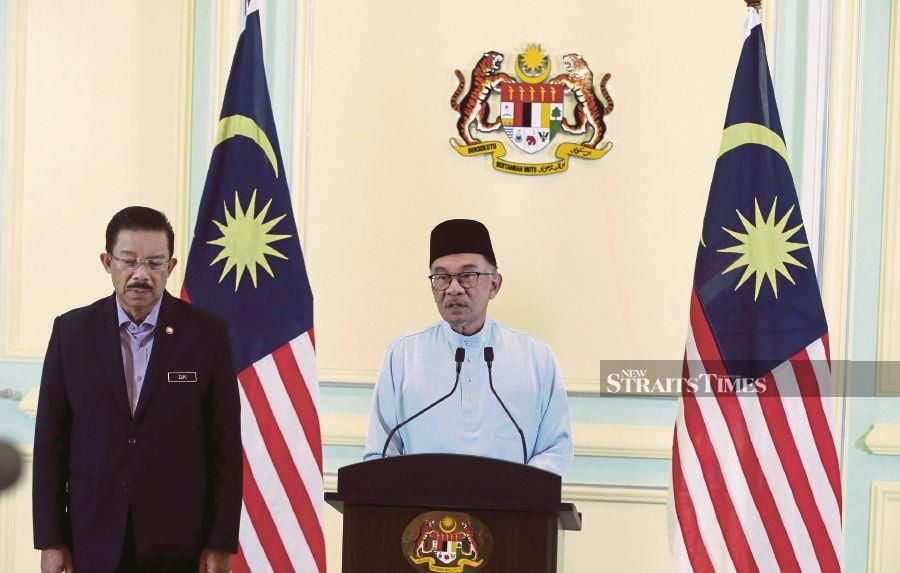
KUALA LUMPUR: Experts believe that despite being labelled a "concession cabinet", Prime Minister Datuk Seri Anwar Ibrahim's core ministerial line-up was one that generally balances expertise with the need to fulfil political considerations.
They also believe that the inclusion of several controversial figures, such as Barisan Nasional (BN) chairman Datuk Seri Dr Ahmad Zahid Hamidi, was necessary to ensure stability for the country and government.
Universiti Putra Malaysia associate professor Dr Mohd Izani Mohd Zain said the prime minister must have taken various scenarios into account when considering his options.
"I am sure Anwar weighed all political factors and considerations before firming up the lineup. The decision he took was definitely not an easy task.
"This was why Anwar needed Zahid as deputy prime minister (DPM) as well as BN secretary-general Datuk Seri Dr Zambry Abdul Kadir, who was defeated in GE15 but now made a minister.
"Anwar's top priority is the stability of the unity federal government. If he did not do that, the government could possibly be shaky. His prime concern was a stable government.
"It is also key that all ministers be effective, working ministers.
"It is time to move on," he told the New Sunday Times.
Izani also felt that Anwar's appointment of Tengku Datuk Seri Zafrul Tengku Abdul Aziz as the International Trade and Industry Minister was due to the latter's track record in helming the finance portfolio.
He said Tengku Zafrul, who was sworn in a senator for the second time to facilitate his ministerial appointment, could offer him continuity as well as insight into the inner workings of the system.
Tengku Zafrul, he noted, also had the added experience of managing the country's finances during the Covid-19 pandemic.
"Anwar's government may want to carry on with the existing policies which Zafrul is familiar with. He (Anwar) is in need of experienced ministers who do not have to start from zero and can hit the ground running."
Izani said this was also likely why DAP secretary-general Anthony Loke and Umno vice-president Datuk Seri Mohamed Khaled Nordin were appointed.
Izani also said that criticism over female under-representation in the cabinet, with only five women ministers, while valid, should also be viewed from another lens.
"They may be small in numbers but they are important portfolios. Entrusting ministries such as health, education and even youth and sports to women demonstrate a recognition of their role in nation-building and human capital."
The five women ministers are PKR Women's chief Fadhlina Sidek (Education), Sekijang member of parliament (MP) Dr Zaliha Mustafa (Health), Segambut MP Hannah Yeoh (Youth and Sports), Datuk Seri Nancy Shukri (Women, Family and Community Development) and Datuk Seri Azalina Othman Said (Law and Institutional Reforms).
On Sabah and Sarawak representation with seven ministers, Izani said it was a reasonable number, with more to be expected when the full list of deputy ministers is eventually announced.
Nusantara Academy for Strategic Research senior fellow Azmi Hassan said the cabinet boasted a healthy mix of old and new faces.
Azmi said Zahid's inclusion was not surprising as the absence of a strong cabinet position for the Umno president and BN chairman could spell trouble for the unity government.
"The government could plunge into instability, so it is little wonder that Zahid was made DPM despite being clouded with court cases. Political factors and stability were obviously among the chief considerations in the cabinet make-up," he said.
Azmi said Sabah and Sarawak appeared to be well-represented in the line-up with seven ministers, which reflected Anwar's inclusive approach in the federal unity government.
As for women representation, Azmi felt more could have been allocated from the current 17 per cent and with deputy ministers yet to be announced, the number could possibly go up to 30 per cent. - NST



No comments:
Post a Comment
Note: Only a member of this blog may post a comment.